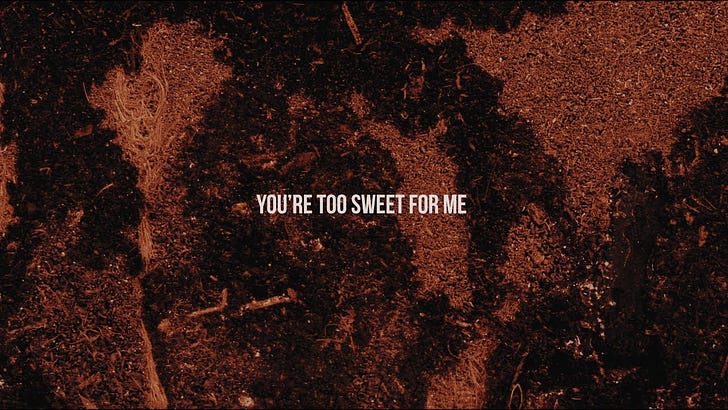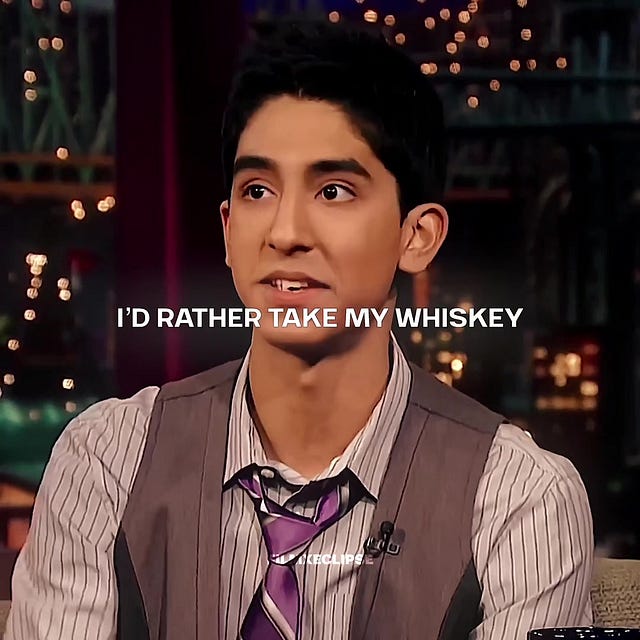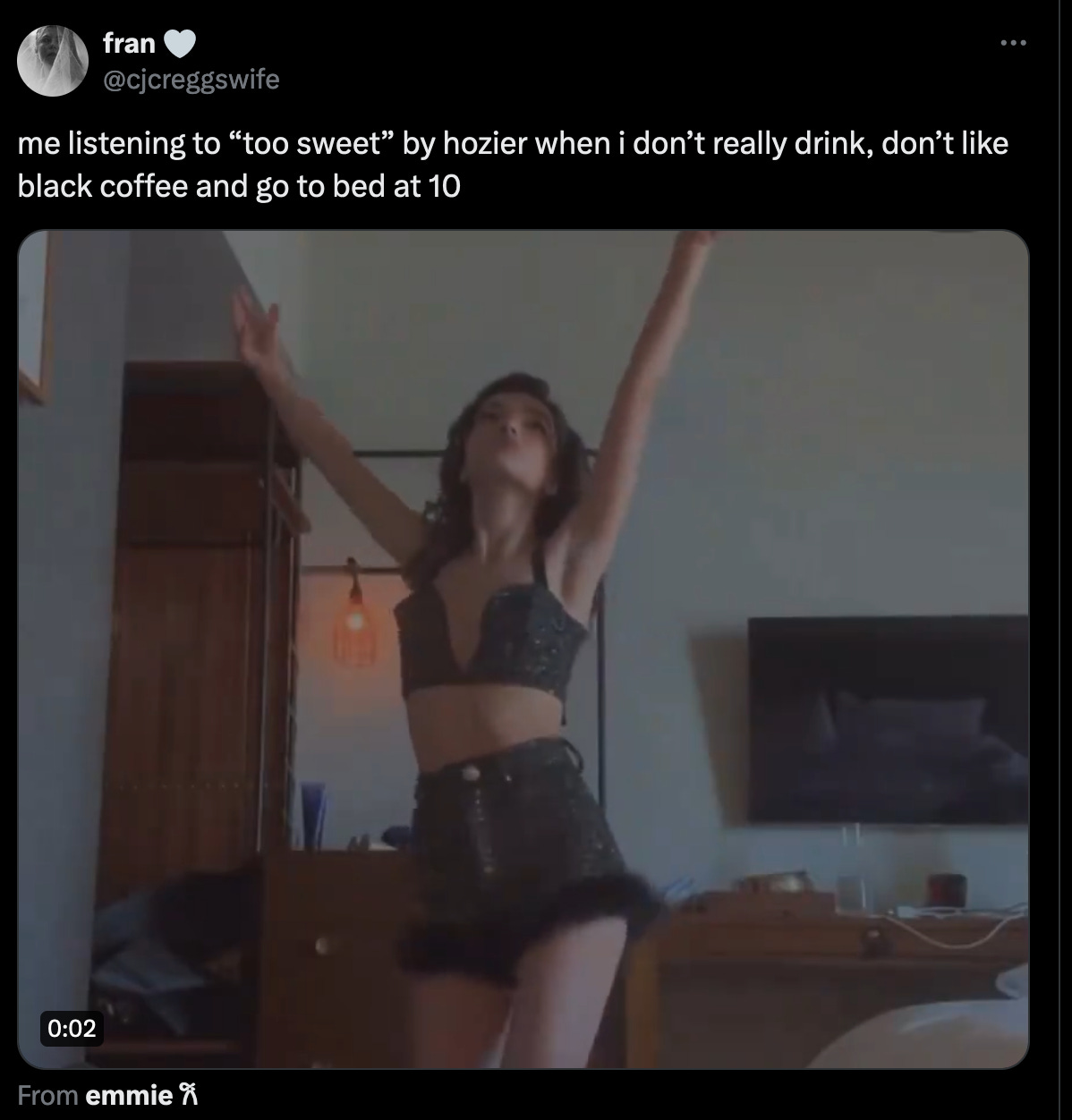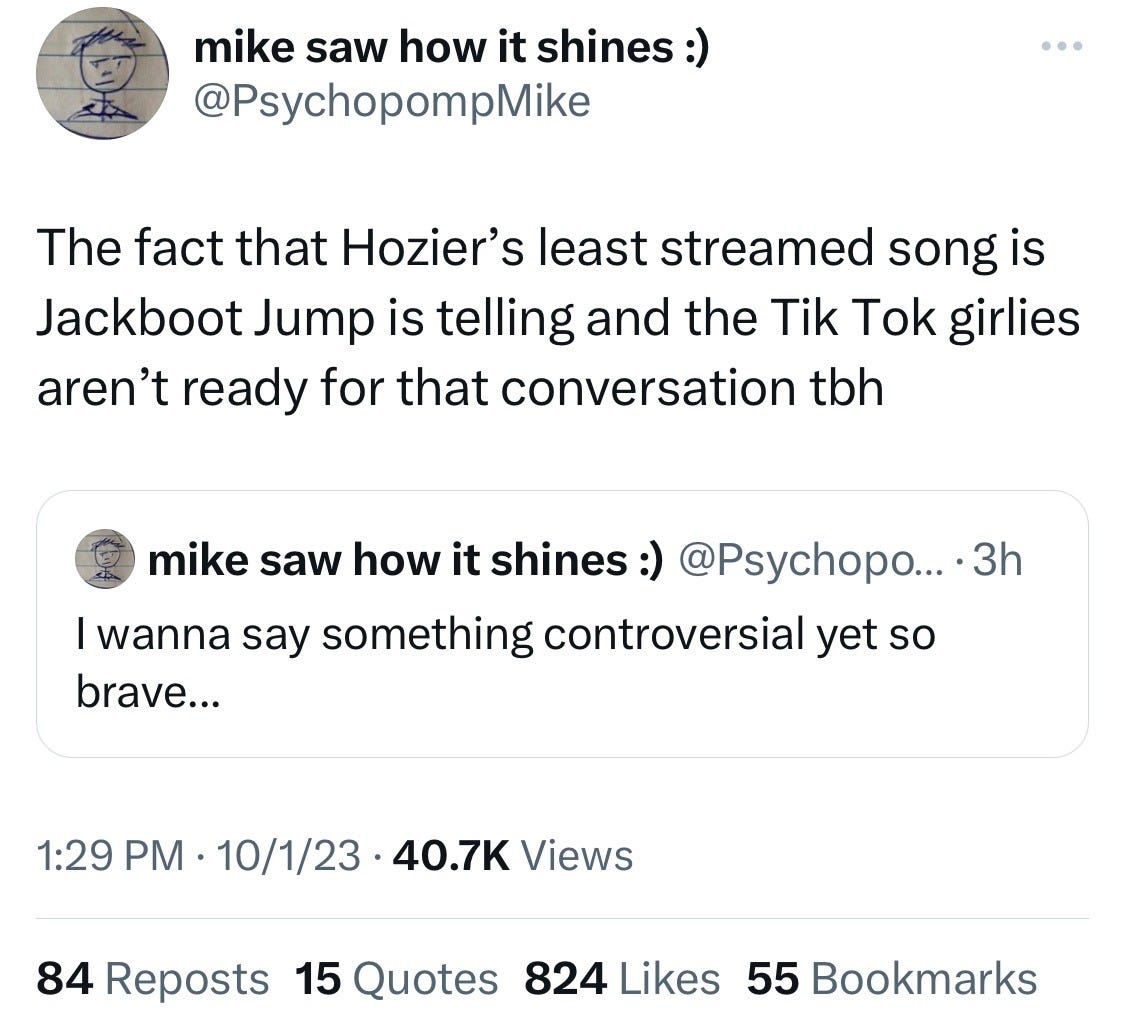The other day I mentioned to my friend that becoming a successful artist, only for the loudest portion of your fan base to continually misinterpret your art, sounds like a punishment out of Greek mythology. They were noting how often it happens within Swiftie circles–where fans who swear Taylor Swift is one of our generation’s lyrical geniuses, regularly only take her lyrics at face value–but in the back of my mind I couldn’t help but think of a conversation I’d had with my girlfriend a few days prior when I’d played Too Sweet, the first song on Hozier’s Unheard EP while we were in the car together.
The chorus, she told me, has become a popular TikTok sound.
I think I’ll take my whiskey neat
my coffee black, and my bed at three
you’re too sweet for me
There are two big trends it seems to follow:
One is a kind of run of the mill “glow up”1 format, where someone will share an older picture of themselves (or their favorite celebrity) for the first few words of the chorus (I’d rather take my whiskey…) and then drop an updated picture of themselves (or the celebrity crush) as the line lands on the word “neat.”
The second features the same clip, soundtracking videos of people pouring themselves a whiskey (neat), holding the glass up to the camera and coming away with a cup of black coffee that they’re then sipping in bed. Amusingly, it seems as if a misunderstanding of the lyrics (coffee black in my bed at three vs. the actual lyric which is coffee black and my bed at three) created the trend’s form.
I know all of this now because I spent way too long scrolling through one video after another, waiting for something different to happen. (It didn’t.)
Unheard features four songs previously not released on Hozier’s latest studio album, Unreal Unearth (and are now available on the extended version of the album, Unreal Unearth: Unheard) which was his exploration of the nine circles of hell featured in Dante’s Inferno. Too Sweet is the first track on the EP, and was (according to Hozier) an alternative to the study of the circle of gluttony that made it onto the album in Eat Your Young.
While Hozier did release a short explanation video for Too Sweet, the fan reception of the song is a frustrating study in the misinterpretation of art as strictly autobiographical:
Obviously, TikTok can’t take 100% of the blame for this. The “maybe the curtains are just blue”2 type has existed long before TikTok came on the scene and will haunt high school English classes long after it has faded into irrelevance. But I do think the way TikTok engages with–and to some extent determines who is successful within–the music industry has played a key role in exacerbating this new style of musical analysis (wherein there is none).
When the only part of a song people engage with is the trending clip on TikTok, the ability to grapple with what it’s actually trying to communicate gets cut off at the knees.3 It’s like writing a book report after reading one chapter of a book.
Each video plays the same clip and features people reenacting the same literal meaning of the lyrics, and it starts to seem like the song is genuinely about a man breaking up with someone based on how she takes her coffee.
“People who think they’re superior for drinking black coffee are so annoying,” my girlfriend (a black coffee drinker) said while the chorus played as we drove.
“It would be annoying,” I said, “if that’s what the song was about!”
Because, of course it seems like that’s what Hozier is singing about when you’ve only heard the chorus. But songs are more than their choruses, and their narrators aren’t always the singers themselves. The rest of the song makes it clear that the narrator isn’t just talking about their habits, but the conflicting worldviews of both him and his partner, which ultimately can’t be reconciled.
Hozier’s explanation for Too Sweet contextualizes it as an alternative exploration of the circle of gluttony (Eat Your Young is the song that made it onto the album in its place), but the way he describes it, both in the short explanation video (with the mention of the phrase “too sweet to be savory”) and through the lyrics themselves, it seems to be a modern illustration of another circle of Dante’s circles of hell: fraud.
In the eight circle of hell, the narrator of Dante’s Inferno, encounters fortune tellers. He finds them with their heads twisted backwards on their bodies as punishment for how they lived in life: for attempting to know what the future held, they’re condemned to an eternity of never being able to see ahead of themselves again.
While our world may not be rich with fortune tellers in the sense of someone sitting down and telling you your future, we’re overrun with messages and messengers telling how to live well, live right, or optimize various components of our lives.
A fortune teller takes your money and gives you a prediction, a wellness influencer signs a contract, gets paid and tells you all your problems will be solved when you sign up for BetterHelp. Do either one of them really know what’s in store for you? Who determined the right way to live? Is there a right way to live?
How do you sleep so well? introduces this sickly sweet partner with a sinister layer, hinting at their ability to turn away from the bitterness and complications of life, taking only what they deem good, and not allowing that goodness to be disrupted.
This sense of toxic positivity, of being too sweet to be savory, of living by unexamined rules is central to the narrator’s partner, and returns again and again throughout the song.
But who wants to live forever, babe?
You treat your mouth as if it's Heaven's gate
The rest of you like you're the TSA
I wish I could go along, babe don’t get me wrong
You know you're bright as the morning
As soft as the rain
Pretty as a vine
As sweet as a grape
If you can sit in a barrel
Maybe I'll wait
Their partner is beautiful, but immature, inexperienced, and intensley regimented in a way that cuts them off from the fullness of the world around them. Their personal ethos is that of the cult of optimization:
“Here are people who won’t drink not because they have any particular problem with it but because the data their Oura ring gathers suggests they sleep 7 percent better on nights they don’t, therefore allowing them to answer emails twenty seconds more quickly. Here are people avoiding coffee half an hour before meeting with their personal trainer who charges as much as a mortgage because they don’t want to reward their brain with a dopamine boost that could become habitual, concerning themselves with the precise receptors through which caffeine and dopamine interact.
It’s boring. It’s exhausting. It’s not sexy. It might not even be healthy.”
Optimization Will Not Save You
Our narrator isn’t emblematic of thoughtless consumption or overindulgence, though their habits are presented as such. When they’re in contrast with their partner’s habits however, it starts to become apparent that our narrator isn’t escaping the world through indulgence, but fully participating in it–including the bitter, uncomfortable parts we’re advised to avoid for a healthy life.
I can admit that I’m being a bit of a wet blanket about this, and I know that people who find Hozier’s music through this trend do have the chance to engage with it beyond the fifteen second clip shared all over social media, and would then be able to sit with more of the themes his work returns to again and again.
But I can also admit that it strikes a particularly frustrating chord that music from Hozier, a deeply anti-colonial artist, only enters the cultural conversation when its political context is ignored:
There’s no harm in enjoying a fifteen second clip of a new song (I, too, was a HitClips4 child), but there is harm in strictly engaging with art in easily consumable chunks with little regard to the social and political context in which they’re written. Hozier’s work is powerfully political, but when his work starts being known as the new TikTok sound, the politics of that work is neglected, and due to that neglect the power of his messages become sanitized and stripped away.
If you want to support our work you can send us a tip here:
play on “grow up” implying you not only got older, but better. in this case, better always means hotter.
https://www.reddit.com/r/funny/s/7atsrM0JA3
hence Hozier having to release an explanation video when the song started trending
https://en.wikipedia.org/wiki/HitClips










![[Verse 1] It can't be said I'm an early bird It's 10 o'clock before I say a word Baby, I can never tell How do you sleep so well? You keep tellin' me to live right To go to bed before the daylight But then you wake up for the sunrise You know you don't gotta pretend Baby, now and then [Verse 1] It can't be said I'm an early bird It's 10 o'clock before I say a word Baby, I can never tell How do you sleep so well? You keep tellin' me to live right To go to bed before the daylight But then you wake up for the sunrise You know you don't gotta pretend Baby, now and then](https://substackcdn.com/image/fetch/$s_!jZq_!,w_1456,c_limit,f_auto,q_auto:good,fl_progressive:steep/https%3A%2F%2Fsubstack-post-media.s3.amazonaws.com%2Fpublic%2Fimages%2F0ae7fdf9-c69b-4559-9c5e-10df7829d03f_772x680.png)


thank you so much!! glad it resonated with you (:
Thank you for this! It really bothers me how people water down hozier's work, especially when he puts so much meaning and intention on every lyric. Seeing someone actually analysing his song in depth and calling out some people's lack of reading compreention it's so refreshing. Like, the curtains are not just blue guys, maybe let's not take everything so literally all the time, please.